翻译讲座2:英汉十大差异
英汉文化的十大差异2
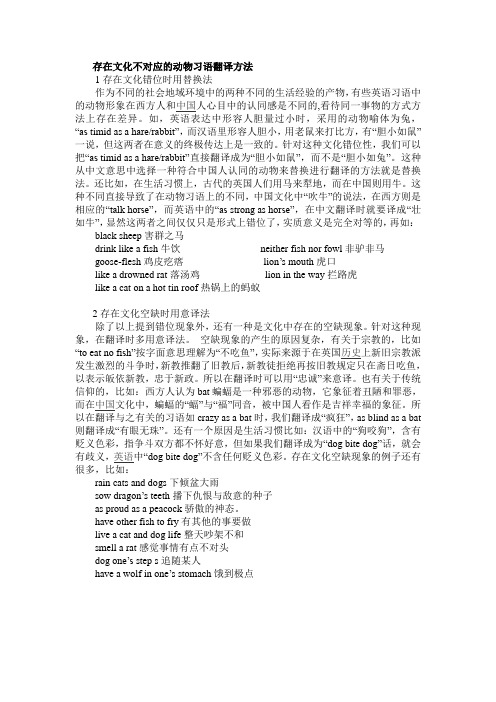
存在文化不对应的动物习语翻译方法1存在文化错位时用替换法作为不同的社会地域环境中的两种不同的生活经验的产物,有些英语习语中的动物形象在西方人和中国人心目中的认同感是不同的,看待同一事物的方式方法上存在差异。
如,英语表达中形容人胆量过小时,采用的动物喻体为兔,“as timid as a hare/rabbit”,而汉语里形容人胆小,用老鼠来打比方,有“胆小如鼠”一说,但这两者在意义的终极传达上是一致的。
针对这种文化错位性,我们可以把“as timid as a hare/rabbit”直接翻译成为“胆小如鼠”,而不是“胆小如兔”。
这种从中文意思中选择一种符合中国人认同的动物来替换进行翻译的方法就是替换法。
还比如,在生活习惯上,古代的英国人们用马来犁地,而在中国则用牛。
这种不同直接导致了在动物习语上的不同,中国文化中“吹牛”的说法,在西方则是相应的“talk horse”,而英语中的“as strong as horse”,在中文翻译时就要译成“壮如牛”,显然这两者之间仅仅只是形式上错位了,实质意义是完全对等的,再如:black sheep害群之马drink like a fish牛饮neither fish nor fowl非驴非马goose-flesh鸡皮疙瘩lion’s mouth虎口like a drowned rat落汤鸡lion in the way拦路虎like a cat on a hot tin roof热锅上的蚂蚁2存在文化空缺时用意译法除了以上提到错位现象外,还有一种是文化中存在的空缺现象。
针对这种现象,在翻译时多用意译法。
空缺现象的产生的原因复杂,有关于宗教的,比如“to eat no fish”按字面意思理解为“不吃鱼”,实际来源于在英国历史上新旧宗教派发生激烈的斗争时,新教推翻了旧教后,新教徒拒绝再按旧教规定只在斋日吃鱼,以表示皈依新教,忠于新政。
所以在翻译时可以用“忠诚”来意译。
英汉语言十大差异
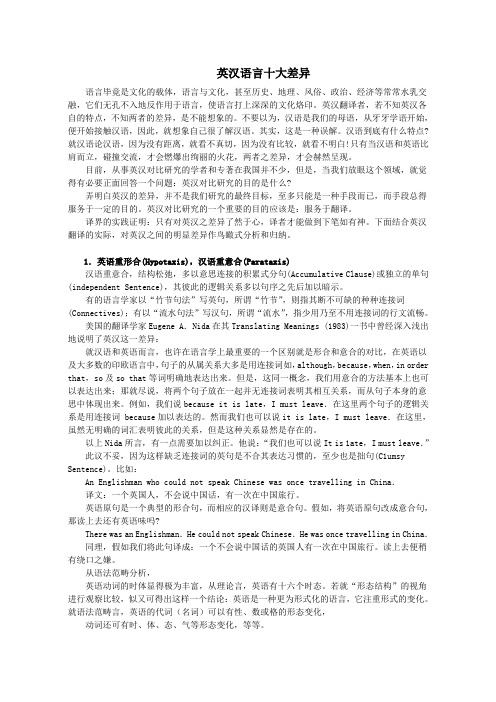
英汉语言十大差异语言毕竟是文化的载体,语言与文化,甚至历史、地理、风俗、政治、经济等常常水乳交融,它们无孔不入地反作用于语言,使语言打上深深的文化烙印。
英汉翻译者,若不知英汉各自的特点,不知两者的差异,是不能想象的。
不要以为,汉语是我们的母语,从牙牙学语开始,便开始接触汉语,因此,就想象自己很了解汉语。
其实,这是一种误解。
汉语到底有什么特点? 就汉语论汉语,因为没有距离,就看不真切,因为没有比较,就看不明白!只有当汉语和英语比肩而立,碰撞交流,才会燃爆出绚丽的火花,两者之差异,才会赫然呈现。
目前,从事英汉对比研究的学者和专著在我国并不少,但是,当我们放眼这个领域,就觉得有必要正面回答一个问题:英汉对比研究的目的是什么?弄明白英汉的差异,并不是我们研究的最终目标,至多只能是一种手段而已,而手段总得服务于一定的目的。
英汉对比研究的一个重要的目的应该是:服务于翻译。
译界的实践证明:只有对英汉之差异了然于心,译者才能做到下笔如有神。
下面结合英汉翻译的实际,对英汉之间的明显差异作鸟瞰式分析和归纳。
1.英语重形合(Hypotaxis),汉语重意合(Parataxis)汉语重意合,结构松弛,多以意思连接的积累式分句(Accumulative Clause)或独立的单句(independent Sentence),其彼此的逻辑关系多以句序之先后加以暗示。
有的语言学家以“竹节句法”写英句,所谓“竹节”,则指其断不可缺的种种连接词(Connectives);有以“流水句法”写汉句,所谓“流水”,指少用乃至不用连接词的行文流畅。
美国的翻译学家Eugene A.Nida在其Translating Meanings (1983)一书中曾经深入浅出地说明了英汉这一差异:就汉语和英语而言,也许在语言学上最重要的一个区别就是形合和意合的对比,在英语以及大多数的印欧语言中,句子的从属关系大多是用连接词如,although,because,when,in order that,so及so that等词明确地表达出来。
英汉差异(张庆艳)
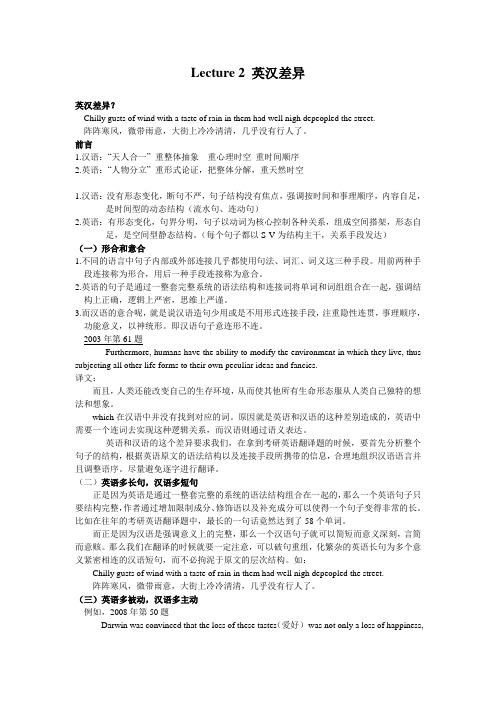
Lecture 2 英汉差异英汉差异?Chilly gusts of wind with a taste of rain in them had well nigh depeopled the street.阵阵寒风,微带雨意,大街上冷冷清清,几乎没有行人了。
前言1.汉语:“天人合一” 重整体抽象重心理时空重时间顺序2.英语:“人物分立” 重形式论证,把整体分解,重天然时空1.汉语:没有形态变化,断句不严,句子结构没有焦点,强调按时间和事理顺序,内容自足,是时间型的动态结构(流水句、连动句)2.英语:有形态变化,句界分明,句子以动词为核心控制各种关系,组成空间搭架,形态自足,是空间型静态结构。
(每个句子都以S-V为结构主干,关系手段发达)(一)形合和意合1.不同的语言中句子内部或外部连接几乎都使用句法、词汇、词义这三种手段。
用前两种手段连接称为形合,用后一种手段连接称为意合。
2.英语的句子是通过一整套完整系统的语法结构和连接词将单词和词组组合在一起,强调结构上正确,逻辑上严密,思维上严谨。
3.而汉语的意合呢,就是说汉语造句少用或是不用形式连接手段,注重隐性连贯,事理顺序,功能意义,以神统形。
即汉语句子意连形不连。
2003年第61题Furthermore, humans have the ability to modify the environment in which they live, thus subjecting all other life forms to their own peculiar ideas and fancies.译文:而且,人类还能改变自己的生存环境,从而使其他所有生命形态服从人类自己独特的想法和想象。
which在汉语中并没有找到对应的词。
原因就是英语和汉语的这种差别造成的,英语中需要一个连词去实现这种逻辑关系,而汉语则通过语义表达。
英语和汉语的这个差异要求我们,在拿到考研英语翻译题的时候,要首先分析整个句子的结构,根据英语原文的语法结构以及连接手段所携带的信息,合理地组织汉语语言并且调整语序。
英汉语言十大差异

译文:奥格尔维进门时带进来一缕雪茄烟雾。(汉语不说:一缕雪茄烟雾伴随奥格尔维进来了)。
2.“Hi!Hi!”said the cab driver, whose doorpopped openat the very sight of a traveler.
Tragedies can be written in literature since there istragedy in life.
这是一“因果”句,英语将“果”置于前,所谓“先果后因”。然而,相应的汉语表达却是:生活中既然有悲剧,文学作品就可以写悲剧。
汉语有一说法:先因后果。这是一典型的“先因后果”句,十分自然妥贴。反之,汉语若说:文学作品可以写悲剧,就是因为生活中有悲剧,就不那么自然了。因此,翻译时,一定要找到重心,因为不同语言有各自的差异。
目前,从事英汉对比研究的学者和专著在我国并不少,但是,当我们放眼这个领域,就觉得有必要正面回答一个问题:英汉对比研究的目的是什么?
弄明白英汉的差异,并不是我们研究的最终目标,至多只能是一种手段而已,而手段总得服务于一定的目的。英汉对比研究的一个重要的目的应该是:服务于翻译。
译界的实践证明:只有对英汉之差异了然于心,译者才能做到下笔如有神。下面结合英汉翻译的实际,对英汉之间的明显差异作鸟瞰式分析和归纳。
1.Hasthe doctor been sent for?译文:去请大夫了吗? 或已经派人请大夫了吗?
2.They want to be listened to.译文:他们希望有人听听他们的意见。
3.He is felt to be a little stiff.译文:人们认为他有点拘谨。
英汉语言十大差异
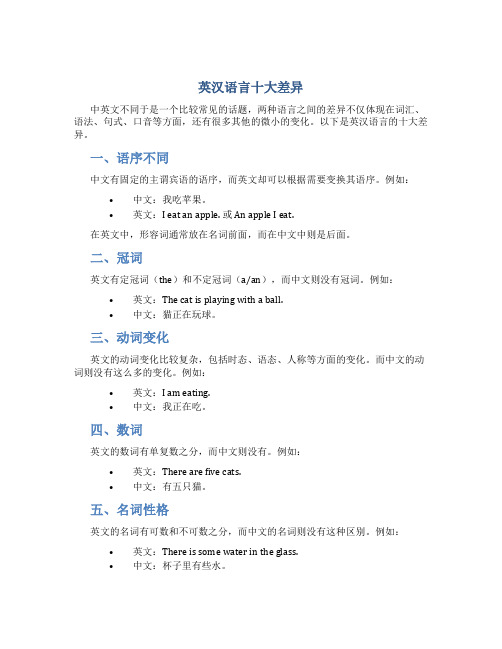
英汉语言十大差异中英文不同于是一个比较常见的话题,两种语言之间的差异不仅体现在词汇、语法、句式、口音等方面,还有很多其他的微小的变化。
以下是英汉语言的十大差异。
一、语序不同中文有固定的主谓宾语的语序,而英文却可以根据需要变换其语序。
例如:•中文:我吃苹果。
•英文:I eat an apple. 或 An apple I eat.在英文中,形容词通常放在名词前面,而在中文中则是后面。
二、冠词英文有定冠词(the)和不定冠词(a/an),而中文则没有冠词。
例如:•英文:The cat is playing with a ball.•中文:猫正在玩球。
三、动词变化英文的动词变化比较复杂,包括时态、语态、人称等方面的变化。
而中文的动词则没有这么多的变化。
例如:•英文:I am eating.•中文:我正在吃。
四、数词英文的数词有单复数之分,而中文则没有。
例如:•英文:There are five cats.•中文:有五只猫。
五、名词性格英文的名词有可数和不可数之分,而中文的名词则没有这种区别。
例如:•英文:There is some water in the glass.•中文:杯子里有些水。
六、代词英文的代词种类较多,包括主、宾、物主等。
而中文的代词比较简单。
例如:•英文:He gave me his book.•中文:他把他的书给了我。
七、词汇用法两种语言的词汇用法也有所不同。
例如:•英文:He is interested in music.•中文:他对音乐很感兴趣。
八、语气两种语言的语气表达方式也有一些差异。
例如:•英文:Could you help me, please?•中文:请你能帮助我吗?九、拟声词中文的拟声词较多,而英文则相对较少。
例如:•中文:咕咚(水声)•英文:drip(滴水声)十、表达感情中文在表达感情时比较直白,而英文则更为委婉。
例如:•中文:我爱你。
•英文:I love you. 或者 I adore you.总的来说,中英文之间有很多差异,这些差异反映了不同文化的不同特点。
英汉比较英汉十大结构性差异课件

目录
• 英汉词序差异 • 英汉句式差异 • 英汉表达方式差异 • 英汉文化背景差异 • 英汉语言发冠词位置差异
01
英语中冠词的位置通常在名词之 前,如“the car is red”。
02
而在汉语中,冠词通常放在名词 之后,如“这辆车是红色的”。
宗教信仰差异对英汉语言的影响
英汉两种语言的很多表达方式都反映了各自的宗教信仰。例如,英语中常用“God”来表 示惊讶或惊讶的程度,而汉语则常用与佛教相关的表达方式,如“天哪”、“我的天”等 。
社会习俗影响
01
社交习惯的差异
在英语文化中,人们通常更注重个人隐私和独立性,而在 汉语文化中,人们更注重集体主义和相互依赖。这种文化 差异在英汉语言表达方式上也有所体现。
02 03
礼貌用语的差异
在英语文化中,人们通常使用更为直截了当的礼貌用语, 而在汉语文化中,人们更倾向于使用含蓄和委婉的表达方 式。例如,英语中常用“Thank you”来表达感谢,而在 汉语中则常用“麻烦你了”、“有劳你了”等更为复杂的 表达方式。
社会习俗差异对英汉语言的影响
社会习俗的差异也对英汉语言的发展产生了影响。例如, 英语中常用“Mr.”、“Mrs.”等称呼来表示对男性和女性 的尊重,而在汉语中则常用“同志”、“师傅”等称呼来 表示彼此之间的亲近和信任。
04
英汉文化背景差异
宗教信仰影响
基督教在英语文化中的影响
基督教在英语文化中有着深远的影响,体现在语言、文学、艺术和价值观等多个方面。例 如,英语中有很多表达方式都源自基督教,如“God help me”、“forgive me my sins”等。
佛教在汉语文化中的影响
翻译讲座2:英汉十大差异
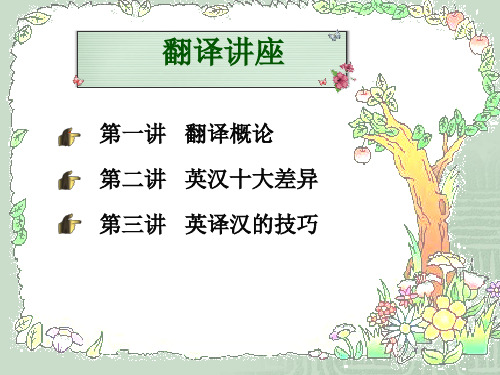
那可能是……地势低洼、连绵数英里、人迹罕至、荒茫贫瘠的白色 干沙漠。
8.英语:重短语;汉语:轻短语
现代语言学研究表明:英语单词并不是大量存在的天然的句法单位之主体。 应该说,英语的句法单位的基本主体是:短语或词组。汉语更偏重以(单 音节或多音节的)单词为其基本的句法成分。
I have never met a person so difficult to understand as my husband.
The diagnosis seems in every case to correspond exactly with all the sensations that I have ever felt.
每次看病的诊断似乎都和我的感觉不谋而合。
It’s a good plan to imagine an argument with a person having a different bias.
2.英语:前重心;汉语: 后重心
就逻辑而言,英汉重心一般均落在结论、断言、结果以及事实上, 其“异”在于重心的位置所在。即“英前汉后”。
e.g. 生活中既有悲剧,文学作品就可以写悲剧。 Tragedies can be written in literature since there is tragedy in life. 揭穿这种老八股、老教条的丑态给人民看,号召人民起来反对老八 股、老教条,这就是五四运动时期的一个极大的功绩。
借助于想象与持不同偏见的人进行辩论,是一个很好的办法。
It may be…a low-lying arid stretch with miles of white sandy beach, and no sign of people, very bleaches and barren.
英语和汉语的十大差异
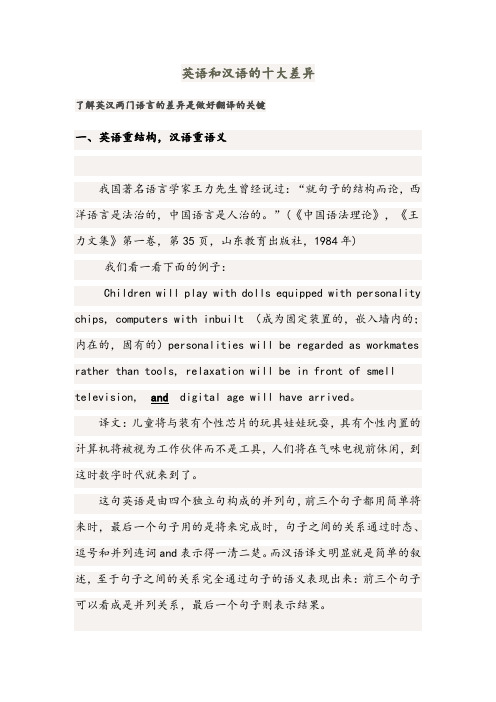
英语和汉语的十大差异了解英汉两门语言的差异是做好翻译的关键一、英语重结构,汉语重语义我国著名语言学家王力先生曾经说过:“就句子的结构而论,西洋语言是法治的,中国语言是人治的。
”(《中国语法理论》,《王力文集》第一卷,第35页,山东教育出版社,1984年)我们看一看下面的例子:Children will play with dolls equipped with personality chips, computers with inbuilt (成为固定装置的,嵌入墙内的;内在的,固有的)personalities will be regarded as workmates rather than tools, relaxation will be in front of smell television, and digital age will have arrived。
译文:儿童将与装有个性芯片的玩具娃娃玩耍,具有个性内置的计算机将被视为工作伙伴而不是工具,人们将在气味电视前休闲,到这时数字时代就来到了。
这句英语是由四个独立句构成的并列句,前三个句子都用简单将来时,最后一个句子用的是将来完成时,句子之间的关系通过时态、逗号和并列连词and表示得一清二楚。
而汉语译文明显就是简单的叙述,至于句子之间的关系完全通过句子的语义表现出来:前三个句子可以看成是并列关系,最后一个句子则表示结果。
二、英语多长句,汉语多短句由于英语是"法治"的语言,只要结构上没有出现错误,许多意思往往可以放在一个长句中表达;汉语则正好相反,由于是"人治",语义通过字词直接表达,不同的意思往往通过不同的短句表达出来。
正是由于这个原因,考研英译汉试题几乎百分之百都是长而复杂的句子,而翻译成中文经常就成了许多短小的句子。
例如:Interest in historical methods had arisen less through external challenge to the validity of history as an intellectual discipline (身心的锻炼,训练;纪律,风纪,命令服从;惩戒,惩罚;学科,科目)and more from internal quarrels among historians themselves.译文:人们对历史研究方法产生了兴趣,这与其说是因为外部对历史作为一门知识学科的有效性提出了挑战,还不如说是因为历史学家内部发生了争吵。
英汉语言十大差异
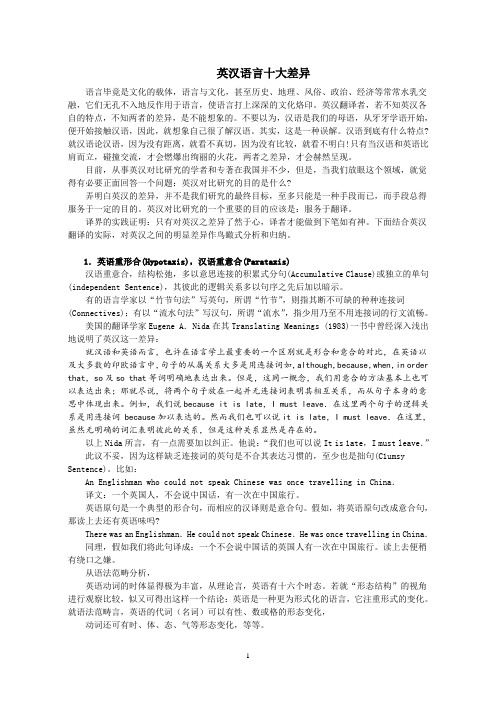
英汉语言十大差异语言毕竟是文化的载体,语言与文化,甚至历史、地理、风俗、政治、经济等常常水乳交融,它们无孔不入地反作用于语言,使语言打上深深的文化烙印。
英汉翻译者,若不知英汉各自的特点,不知两者的差异,是不能想象的。
不要以为,汉语是我们的母语,从牙牙学语开始,便开始接触汉语,因此,就想象自己很了解汉语。
其实,这是一种误解。
汉语到底有什么特点? 就汉语论汉语,因为没有距离,就看不真切,因为没有比较,就看不明白!只有当汉语和英语比肩而立,碰撞交流,才会燃爆出绚丽的火花,两者之差异,才会赫然呈现。
目前,从事英汉对比研究的学者和专著在我国并不少,但是,当我们放眼这个领域,就觉得有必要正面回答一个问题:英汉对比研究的目的是什么?弄明白英汉的差异,并不是我们研究的最终目标,至多只能是一种手段而已,而手段总得服务于一定的目的。
英汉对比研究的一个重要的目的应该是:服务于翻译。
译界的实践证明:只有对英汉之差异了然于心,译者才能做到下笔如有神。
下面结合英汉翻译的实际,对英汉之间的明显差异作鸟瞰式分析和归纳。
1.英语重形合(Hypotaxis),汉语重意合(Parataxis)汉语重意合,结构松弛,多以意思连接的积累式分句(Accumulative Clause)或独立的单句(independent Sentence),其彼此的逻辑关系多以句序之先后加以暗示。
有的语言学家以“竹节句法”写英句,所谓“竹节”,则指其断不可缺的种种连接词(Connectives);有以“流水句法”写汉句,所谓“流水”,指少用乃至不用连接词的行文流畅。
美国的翻译学家Eugene A.Nida在其Translating Meanings (1983)一书中曾经深入浅出地说明了英汉这一差异:就汉语和英语而言,也许在语言学上最重要的一个区别就是形合和意合的对比,在英语以及大多数的印欧语言中,句子的从属关系大多是用连接词如,although,because,when,in order that,so及so that等词明确地表达出来。
Lecture 2 英汉对比
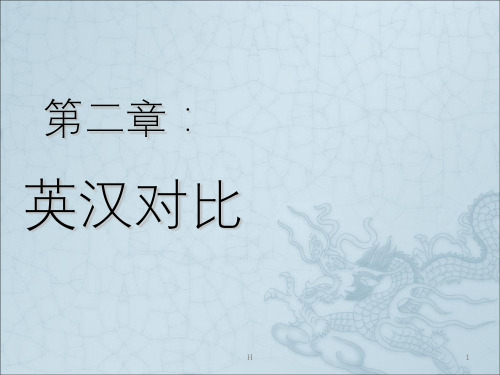
"And isn't it odd how people here can eat their dessert
and then return to their main courses? How can they bear it?" 西餐有其特定的饮食次序。如果和外国人一起吃西餐,我们 最好遵循他们的用餐习惯。千万不要吃完甜食再吃主菜哦。
形合与意合
形合 意合
汉语 英语
提示: 枯藤老树昏鸦 小桥流水人家
H
重词形与句法 重直觉,强调意识流
5
Compare
Even if the monk can run away, his temple cannot run with him. 跑得了和尚,跑不了庙。
Modesty helps one go forward, whereas conceit makes one lag behind. 谦虚使人进步,骄傲使人落后。 冬天来了,春天还会远么?
Lisa 的误解归因于中西方文化的碰撞与冲突。做客的时候,让我 们看看西方人对中国人还有可能在哪些方面产生误解。
“I must say I don‘t think I’ll ever get used to the eating habits out here. You know, the way people put things on your plate...” 外国人不习惯中国人热情地往自己 碗里夹菜。
If winter comes, can spring be far behind?
人不犯我,我不犯人。
We will not attack unless we are attacked.
H
英汉十大差异

•
The people of a small country can certainly defeat aggression by a big country, if only they dare to rise in struggle, dare to take up arms and grasp in their own hands the destiny of their own country. 译文 小国人民敢于起来斗争,敢于拿起武器, 掌握自己国家的命运,就一定能够战胜大国 的侵略。 • 揭穿这种老八股、老教条的丑态给人民看, 号召人民起来反对老八股、老教条,这就是 五四运动时期的一个极大的功绩。 译文 A A tremendous achievement of the May 4th Movement was its public exposure of the ugliness of old stereotype and the old dogma and its call to the people to rise against them.
译文 我们就住在路边。过路人和外乡人常到 我们家,尝尝我们家酿的酸果酒。这种酒很 有名气。我敢说,尝过的人,从没有挑剔过。 我这话像历史学家说的话一样靠的住。 7. 英语重后饰;汉语重前饰 • The diagnosis seems in every case to correspond exactly with all the sensations that I
• It may be… a low-lying arid stretch with miles of white sandy beach, and no sign of people, very bleached and barren. 译文 那可能是……低洼、连绵数英里、人迹
第2讲 英汉语言十大差异

• 前重心就是指先说结果后说细节; 后重心 前重心就是指先说结果后说细节; 就是先说细节后说结果。 就是先说细节后说结果。 • 一般来说,英语都是句首重心,也就是 一般来说,英语都是句首重心, 倾向于将新信息或最主要的部分安置在 句子的开头, 句子的开头,而汉语中句子信息结构的 一个本质特征是末端中心。 一个本质特征是末端中心。 • 当句子中既有叙事部分又有表态部分时, 当句子中既有叙事部分又有表态部分时, 英语通常表态在前、叙事在后。 英语通常表态在前、叙事在后。英语句 子往往先总结,然后再加以阐述, 子往往先总结,然后再加以阐述,而汉 语则常常先交待事情,然后再总结。 语则常常先交待事情,然后再总结。 • 英语句序灵活,汉语注重因果逻辑关系, 英语句序灵活,汉语注重因果逻辑关系,
• • • • • • • • • •
Ten linguistic differences between English and Chinese 英汉语言十大差异 1. synthetic vs. analytic 综合性与分析性 2. hypotactic vs. paratactic 形合与意合 3. pre-emphasis vs. post-emphasis 前重心与后重心 4. associative vs. logical 引申与推理(第3讲) 引申与推理( 讲 5. static vs. dynamic 静态与动态 (第4讲) 讲 6. abstract vs. concrete 抽象与具体 (第5讲) 讲 7. substitutive vs. repetitive 替换与重复 (第6讲) 讲 8. passive vs. active 被动与主动 (第7讲) 讲 9. impersonal vs. personal 物称与人称 (第7讲) 讲 10. roundabout vs. straightforward 间接与直接 8
- 1、下载文档前请自行甄别文档内容的完整性,平台不提供额外的编辑、内容补充、找答案等附加服务。
- 2、"仅部分预览"的文档,不可在线预览部分如存在完整性等问题,可反馈申请退款(可完整预览的文档不适用该条件!)。
- 3、如文档侵犯您的权益,请联系客服反馈,我们会尽快为您处理(人工客服工作时间:9:00-18:30)。
The author’s new book on phonetics recently published is more than worth reading.
作者最近出版的语音著述太值得一读了。
You must stand up for your friend.
The radio squeaks midnight. The cafes must be closing, the last guests going home. Lovers stand before house doors unable to take leave of each other.
英语的物称最显见于对主语的择定。英语常选择不能施行动作或无生命事物 的词语作主语。相对而言,汉语一般更习惯于人称化的表达,尤其是主语, 能施行动作或有生命的物体为主语之首选。
1) A wave of cigar smoke accompanied Ogilvie in.
奥格尔维进门时带进一缕雪茄烟雾。
不瞒您说,我并没有想到会在这里听到讲牡蛎。我曾/本以为广岛仍 笼罩在那场原子灾难的阴影之中。
10.英语:重形态;汉语:轻形态
英语是更为形式化的语言,它注重形式的变化,也善于形式的变化。 英语的代词(名词)有性、数或格的形态变化, 动词有时、体、态、气等形态变化。 英语许多词都有供识别的形态标记,如-able, -ful, -ive等形容词词缀, -ness, -al, -tion, -ment等名词词缀。
那可能是……地势低洼、连绵数英里、人迹罕至、荒茫贫瘠的白色 干沙漠。
8.英语:重短语;汉语:轻短语
现代语言学研究表明:英语单词并不是大量存在的天然的句法单位之主体。 应该说,英语的句法单位的基本主体是:短语或词组。汉语更偏重以(单 音节或多音节的)单词为其基本的句法成分。
I have never met a person so difficult to understand as my husband.
翻译讲座
第一讲 翻译概论 第二讲 英汉十大差异 第三讲 英译汉的技巧
翻译讲座
第二讲
英汉之差异
英汉十大差异
1. 英语:重形合,汉语:重意合 2. 英语:前重心;汉语: 后重心 3. 英语:静态语言;汉语:动态语言 4. 英语:重物称;汉语:重人称 5. 英语:多被动;汉语:多主动 6. 英语:多复合长句;汉语:多简单短句 7. 英语:重后饰;汉语: 重前饰 8. 英语:重短语;汉语:轻短语 9. 英语:重时体;汉语:轻时体 10. 英语:重形态;汉语:轻形态
英语与汉语就句子的逻辑重心而言,前者惯于前置,“先声”夺人; 后者善于后移,“后发”制人。 但以“语序”观,两者通常都采用“主谓宾”(SVO)的线性排列顺 序。 具体而言,英语的修饰语既可以前置,又可后置,但修饰语若为短 语或分句,则往往后置。汉语的修饰语无论是词、短语或句子,总 是前置。英语以“尾重”为美,而这种“美”多半依靠“重后饰” 的表达习惯铸成。
此外,英语中许多微妙精细的语气、感觉、寓意等也是借助其丰富的时体 自然传递的。
They were building a dam last winter.
They built a dam last year.
I heard a knock at the door.
I am hearing (=attending) lectures at the college.
2) Bitterness fed on the man who had made the world laugh.
这个让全世界的人发出笑声的人自己却饱尝辛酸。
3) “Hi!Hi!” said the cab driver, whose door popped
open at the very sight of a traveler.
A tremendous achievement of the May 4th Movement was its public exposure of the ugliness of old stereotype and the old dogma and its call to the people to rise against them.
你得支持你的朋友。
To be kind to the enemy is to be cruel to the people.
对敌人仁慈就是对人民残忍。
Mary is considering changing her job.
玛丽正在考虑调换工作。
9.英语:重时体;汉语:轻时体
英语有16个时态;而汉语动词除了只有“着”、“了”、“过”与英语 的进行时、完成时或过去时相比之外,别无其他与英语对应的时体方式。 英语可以通过固定的语法手段将动作的进行过程与状态作更准确、更精 细的描绘。有时这种描绘还能融入作者或说话人的一种感情色彩。
That would be the confirmation that it was in general use.
这将证实其使用是非常普遍的。 一看见他,我就感到紧张。
The very sight of him makes me nervous.
对此我深信不疑。
I’m sure of it.
4.英语:重物称(impersonal);汉语:重人称(personal)
2.英语:前重心;汉语: 后重心
就逻辑而言,英汉重心一般均落在结论、断言、结果以及事实上, 其“异”在于重心的位置所在。即“英前汉后”。
e.g. 生活中既有悲剧,文学作品就可以写悲剧。 Tragedies can be written in literature since there is tragedy in life. 揭穿这种老八股、老教条的丑态给人民看,号召人民起来反对老八 股、老教条,这就是五四运动时期的一个极大的功绩。
3.英语:静态(static)语言;汉语:动态(dynamic)语言
英语:少用(谓语)动词;汉语:兼语式或连动式。
英语静态特征是多维的:句法方式或词汇方式。前者如使用非谓语动词、
省略动词、将动词名词化。后者如使用动词的同源名词、同源形容词、介 词及副词等。 我疯狂地爱上了她,她也疯狂地爱上了我。
I fell madly in love with her, and she with me.
I forget his name. I am forgetting (=beginning to forget) how to speak French.
正因为英汉有别,有时英语“略施”时体“灵巧小计”,汉语 则只得“动用”词汇手段。 It has often been noted that those who live, or have lived, in the shadow of death bring a mellow sweetness to everything they do. ---Helen Keller 人们已经注意到大凡受到死亡威胁的人或是死里逃生的人对于 他们所干的任何事总是兴趣盎然。
《华盛顿邮报》的一篇社论提供了一个ived near the road, we often had the traveler or stranger visit us to taste our gooseberry wine, for which we had great reputation, and I confess, with the veracity of an historian, that I never knew one of them to find fault with it.
He is always thinking of how he could do more for the people.
他总是考虑如何为人民做更多的事。 赞扬
In the large entrance-hall visitors are constantly coming and going.
大厅里访客不断,你来我往,川流不息。 惊讶
……此时咖啡馆也许正在打烊,最后一批顾客也许正在出店回家,出 了店门的情侣们正难舍难分。
I must confess that I did not expect a speech about oysters. I thought that Hiroshima still felt the impact of the atomic cataclysm.
1.英语: 重形合(hypotaxis),汉语: 重意合(parataxis)
汉语-----loosely structured: accumulative clause/independent sentence) 彼此的逻辑关系多以句序之先后加以暗示。
汉语:“流水句法”;英语:“竹节句法”
e.g. It’s late, I must leave. Because it’s late, I must leave. 跑得了和尚,跑不了庙。 The monks may run away, but the temple cannot run away with them.
他游泳游得不错。
He is a good swimmer.
He is a good listener. He is a good reader. He is a good learner. He is not much of a pianist/singer. Our professor is something of an eccentric adj. 古怪的,反常的 n. 古怪的人 我们教授的性情多少有点儿古怪。
“嗨!嗨!”出租车司机嚷道,他一瞅见旅客就“砰”地打开车门。
